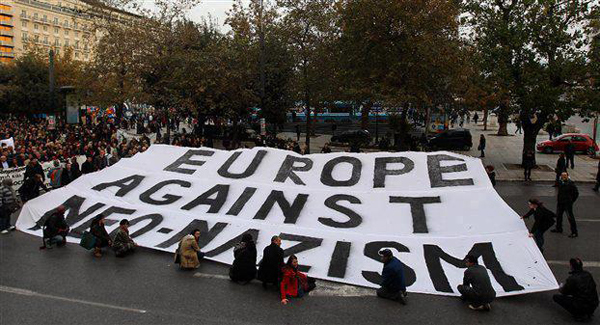Archetypes of fascism by Umberto Eco and the Armenian reality
Recently, the Russian neo-Nazi activist, Maxim Martsinkevich, known as by nickname “The Hatchet”, once again is sentenced to 5 years in prison by one of the court in Moscow, on charges of inciting mid-ethnic hatred. During one of the previous lawsuits, the “Hatchet” has shouted with his friends “Heil Hitler”, and recently, the material staging the “death ritual execution of a Tajik man selling drugs” has appeared on the Internet. The “hatchet” thus acts with fascism’s explicit and therefore marginal propaganda. This propaganda is very rarely encouraged at the state level. Perhaps, only in special circumstances and in the countries like Azerbaijan.
But this, as they say, is the visible peak of the iceberg. People may not wear black shirts, not to roar in a mass ecstasy, not even exercise aggression against the neighboring country, but in their countries, at first glance quite democratic, fascism elements can be observed.
Fascism is actually a very diverse phenomenon, it is manifested differently in different countries, and it is not necessarily to be guided by national-socialist ideology, concentration camps, and deliriums of conquering the world. There are manifestations that are more or less identical in all the countries, and their combination, from time to time, leads to a tragic explosion that shakes the country, and sometimes also the whole world. And these manifestation may happen in Armenia, Russia, the United States, Greenland, and everywhere.
Italian writer and philosopher Umberto Eco tries to separate these recurring features of fascism, in scientific terms, the archetypes. The Italian’s essay has a remarkable name “Eternal Fascism”. Let’s make a reference to the writer’s mentioned several points, which, in my opinion, are directly connected to Armenia. And so. According to Umberto Eco, one of the stable features of fascism is irrationalism. Accordingly, thinking is not a man’s job, he should always act, desirable, heroically. Suspicion of an intellectual world is specific to fascism, “I do not like reading a book.” In the Soviet Union, there was a certain reverence to people with intellectual disabilities, later on, the development of market relations naturally moved them to the second plan. The structure of the organizations is entirely consistent with this principle: the “leader” usually does not tolerate minded people beside him, there should be a “choir” of admirers of him. And partly, the abundance of parties is due to this, “to become the first person and I would also tell a few people, “hey, guys, move to this side, hey, guys, move to that side.”
In the opinion of the Italian philosopher, the support of fascism is the middle class subjected to frustration, which is affected by any economic or political crisis. Most of the citizens of Armenia visualizes their recent 25 years of life as a disaster, in which naturally the government is to be blamed. Frustrated and broken people are excessively fertile ground for dissemination of totalitarian ideas, “this nation needs Stalin.” Here comes another feature, which is mentioned by Umberto Eco: the community should feel offended of itself that it is not enough that the “enemies” are richer and prosperous than they are, moreover, they are constantly demonstrating their being successful. He, the writer, remembers that in his childhood (when Mussolini was in power), the British were visualized as a nation that eats 5 times a day. In a country, where the middle class constituted a small percent (like Armenia), provoking hatred to the rich was one on one.
And finally, a feature that we, Armenians, treats the most: the worship of the idea of conspiracy, preferably, an international conspiracy. Fascism “recipe” includes the situation where people need to feel them in a besieged castle. I do not know to what extent Umberto Eco was familiar with the history of the Armenian political thought, but sometimes it seems to me that the “theory of conspiracy” is invented by Armenians.
…So, “Hatches” may be born in everywhere, including in our Armenian land, and in case of the “parade of planets”, such people may not be imprisoned.
ARAM ABRAHAMYAN




















































